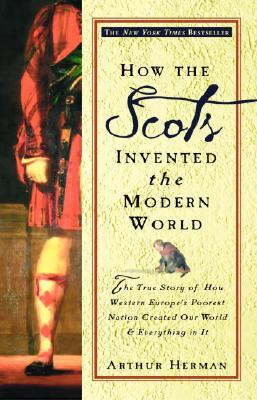 Please buy the book here.
Please buy the book here.
“Being Scottish is more than just a matter of nationality or place of origin or clan or even culture. It is also a state of mind, a way of viewing the world and our place in it”. “A large part of the world turns out to be Scottish without realizing it”.
The first part, Epiphany, consists of 8 chapters and focuses on the roots, development, and impact of the Scottish Enlightenment on Scotland and Great Britain. The roots come from an appreciation for democracy and literacy that developed from the Scottish Reformation, when John Knox brought Calvinist Presbyterianism to Scotland. He preached that God ordained power into the people and that it was for the people to administer and enforce God’s laws, not the monarchy. For people to understand God’s laws they had to be able to read the Bible, so schools were built in every parish and literacy rates grew rapidly, creating a Scottish-oriented market for books and writers.
The English and Scots joined in 1707 to form the Kingdom of Great Britain. The Scots immediately benefited from a centralized government that paid little attention to it – for example, inexpensive imports reduced the impacts of famines and allowed a Scottish culture to flourish. Herman calls the Scottish Enlightenment “more robust and original” than the French Enlightenment.
The defeat of the 1745 Jacobite rising decimated the social structure based around clans and chieftains. Their literate foundation allowed the Scots to become economically literate and take advantage of trade. Edinburgh and Glasgow became epicenters of intellectual thought. There existed in Scotland a clergy who believed that a moral and religious foundation was required for, and compatible with, a free and open sophisticated culture, which moderated hardline conservatives. Herman presents biographies of Francis Hutcheson, James Boswell, David Hume, John Stuart Mill, Henry Home (Lord Kames), Robert Adam, Adam Smith, James Burnett and others to illustrate the Scottish development.
The second part, Diaspora, focuses on the impacts of Scots on events, the world, and industries. Scots built the White House. David Livingstone opened up Africa. Many Scots were Cleared or deported to the American colonies. Herman claims that the Scottish School of Common Sense influenced much of the American declaration of independence and constitution – half the signers of the Declaration of Independence were Scots. Daniel Boone, Jim Bowie, Sam Houston, Kit Carson, Patrick Henry, Gen. Winfield Scott, Andrew Jackson, John Paul Jones, and William Clark (of the Lewis and Clark expedition) had roots in Scotland. It was said in 1778 of the American Revolution: “Call this war by whatever name you may, only call it not an American rebellion: it is nothing more or less than a Scotch Irish Presbyterian rebellion.”
After Great Britain lost the American colonies, a second generation of Scottish intellectuals saved Britain from stagnation and reinforced a self-confidence that allowed the country to manage a world empire during the Victorian era. Scots in India, like James Mill, led the British idea of ‘liberal’ imperialism, that they had to take over indigenous cultures and run their society for their own good, the white-nationalist euphemism “the white man’s burden”. Scots were still leaders in America: John Muir “Father of the National Parks”, Andrew Carnegie built railroads, steel mills, and libraries. Herman claims that Sir Walter Scott invented the historical novel, giving modernity a “self-conscious antidote”, and gave literature a “place as part of modern life”. In literature, we had Robert Burns, Robert Louis Stevenson, Arthur Conan Doyle. In science, medicine and technology, Alexander Graham Bell, Joseph Black, James Clerk Maxwell, Colin Maclaurin, William and John Hunter, James Hutton and William Thompson (Lord Kelvin).
In science and industry Herman states that James Watt’s steam engine “gave capitalism its modern face, which has persisted down to today”. It permitted business to choose its location, in cities close to inexpensive labor, and it was Scots who rectified negative impacts industry had, i.e. the public health movement. Scots’ contribution to modern society is illustrated with biographies of Scots like Dugald Stewart, John Witherspoon, John McAdam, Thomas Telford, and John Pringle, among others.
Yes Edinburgh West has a website, Facebook, Twitter, National Yes Registry and a Library of topics on Scottish Politics, including Independence.
